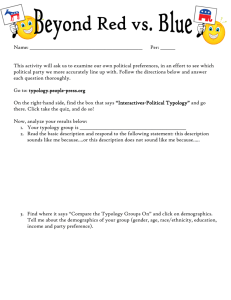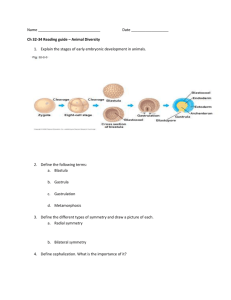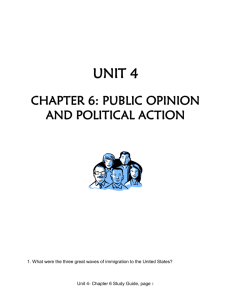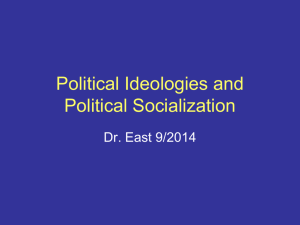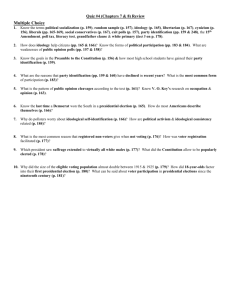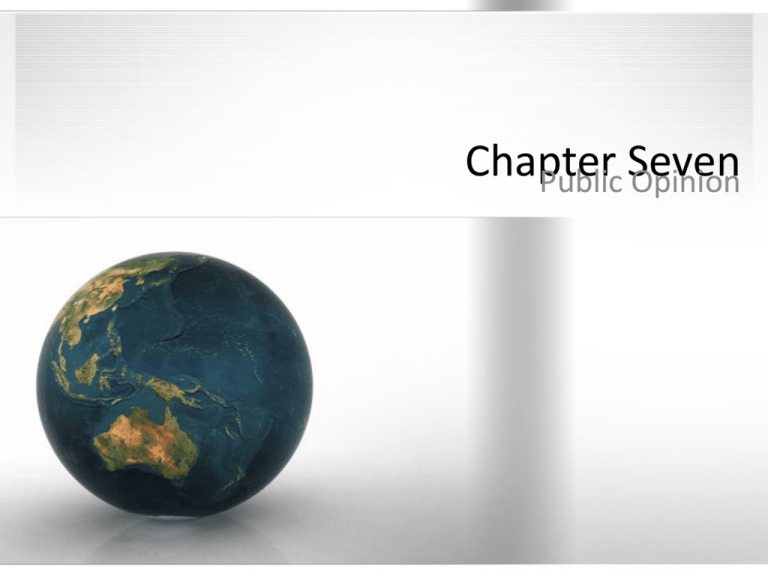
Chapter
Seven
Public Opinion
What is Public Opinion?
• Public opinion: How people think or feel about
particular things
• Not easy to measure
• The opinions of active and knowledgeable
people carry more weight
7|2
Pres. Bush Public Opinion
• Gallup polling and President Bush
7|3
How Polling Works
• Pollsters need to pose reasonable questions that
are worded fairly
• They have to ask people about things for which
they have some basis to form an opinion
7|4
• Women suffering???????
7|5
Random Sampling
• Random sampling is necessary to insure a
reasonably accurate measure of how the entire
population thinks or feels
• For populations over 500,000, pollsters need to
make about 15,000 phone calls to reach 1,065
respondents, insuring the poll has a sampling
error of only +/- 3%
.
7|6
How Polling works
• The Process
7|7
How Opinions Differ
• Opinion saliency: some people care more about
certain issues than other people do
• Opinion stability: the steadiness or volatility of
opinion on an issue
• Opinion-policy congruence: the level of
correspondence between government action and
majority sentiment on an issue
7|8
Student Political Orientation by
Gender
7|9
College Students Views
7 | 10
Political Socialization
• Political socialization: the process by which personal
and other background traits influence one’s views about
politics and government
– Family: Party identification of your family is
absorbed, although children become more
independent-thinking with time
– Religion: Families form and transmit political beliefs
through their religious tradition
7 | 11
Political Socialization
The Family
Odds are, you will become your folks (yeah, sorry
about that..)
How does that happen….
1) Your parents are your primary instructor of
right and wrong. As you grow and accept this role,
it becomes natural to accept their political views
as an extension of right/wrong.
2) Often your extended family will have the
same political outlook as your folks, again it
becomes natural to accept those views as “right”
Religion
Religion and religious traditions teach a
way of viewing the world
Religion often has a pronounced impact
on peoples view on social issues (gay
marriage) Chart-p.158
Religion often has less of on impact on
non-social issues (Iraq War)
Gender
Just as a gender impacts how a person views
the world ( compare The Lifetime Network and
Spike TV), gender can impact on a persons view
of political issues
Men often poll high in concerns over: defense,
gun rights and crime.
Women often poll high in concerns over:
health care, gun control and anti-poverty
programs
Chart p. 159
Cleavage
• No……that’s not the type of cleavage we’re
talking about…c’mon now…
• In Political Science cleavage is a concept used in
voting analysis and is the division of voters into
voting blocs.
– These voting blocks do not always fall neatly into
political party platform
– Many times politicians or parties will target cleavage
issues to attract new voters
– Issues that lead to/cause cleavage are called Wedge
7 | 15
Issues
The Gender Gap
• Women have slightly higher turnout rates than men
• In 2009, about 42 percent of women, and 32 percent of
men, identified themselves as Democrats
• This reflects attitudinal differences between men and
women about gun control, the economy, and social
programs.
7 | 16
Gender Gaps on Issue Importance
(2006)
7 | 17
Education
• From 1920s through 1960s, studies showed a
college education had a liberalizing effect,
possibly because of exposure to liberal elites
• In the past generation, increased schooling has
not been associated with increased political
activity.
7 | 18
Social Class
• Social class: ill-defined in U.S., though recognized
in specific cases (e.g., truck drivers and
investment bankers)
• Social class is less important in the U.S. than in
Europe; the extent of cleavage has declined in
both places
7 | 19
Social Class
While we pride ourselves as a nation that is
“classless”, social scientists break society down
by 2 generic categories:
Blue Collar – jobs that involve some type of
physical activity. Can range from waitress to
truck driver to carpenter. More likely to vote
Democratic
White Collar – jobs that involve little
physical effort, often a management type of
position. More likely to vote Republican.
Regional Differences
• White southerners are more conservative than
other regions regarding aid to minorities,
legalizing marijuana, school busing, and rights of
the accused
• Southerners are now significantly less
Democratic than they were for most of the 20th
century
7 | 21
Race and Ethnicity
Certain racial/ethnic groups often trend
toward one party or another.
African-Americans trend heavily democratic
Hispanic –Americans recently have been
trending democratic
Asian-Americans tend to split between the 2
major parties
Political Ideology
• Political ideology: a more or less consistent set
of beliefs about what policies government ought
to pursue
• The great majority of Americans do not think
ideologically
• People may have strong predispositions even if
they do not satisfy the condition of being
“ideological”
7 | 23
Liberals and Conservatives
• When asked, 40 percent of Americans self-identify as
moderate, 30 percent as conservative and 20 percent
as liberal.
• However
– Most Americans do not think about politics in an ideological
or very coherent manner;
– Most Americans pick and choose their policy positions
without regard to ideology, and without feeling the need to
be “consistent”
– Some people hide their true policy preferences under a
perceived pressure to be “politically correct”
7 | 24
Typology
Typology – a detailed examination of voter
ideological views.
Breaks voters into 9 groups: Enterprisers, Social
Conservatives, Pro-Government Conservatives,
Upbeats, Disaffected, Conservative Democrats,
Disadvantaged Democrats, Liberals & Bystanders.
Go to http://typology.people-press.org/typology see
where you fit in
Ideology
Typology:
Nine Groups
and Their
Key Values
Copyright © Houghton Mifflin Company.
All rights reserved.
7 | 26
Political Elites
• Political elites: those who have a
disproportionate amount of some valued
resource
• Elites influence public opinion by framing
issues and stating norms
• But elite influence only goes so far; they do not
define problems that are rooted in personal
experience
7 | 27

